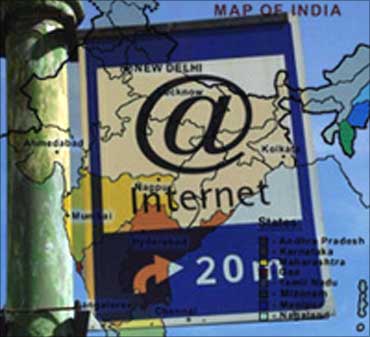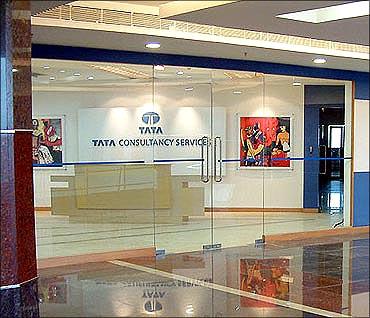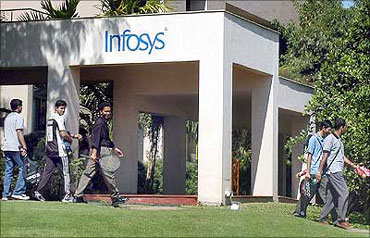Shivani Shinde and Bibhu Ranjan Mishra in Mumbai/Bengaluru
With growth returning, tech services companies see spike in expenses to bridge demand-supply mismatch; difficulty in obtaining H1-B visa is also an issue.
A dearth of skilled staff, especially for high-end technologies, coupled with difficulty in obtaining H1-B visas, is prompting Indian IT companies to hire more people on a temporary basis overseas.
Figures tell the story.
While the employee cost among the top three Indian IT firms has been steadily increasing, the expense on subcontractors (those who arrange for temporary hires) appears to be skyrocketing.
. . .IT majors raise temp hiring for skilled jobs
India's largest IT services firm, Tata Consultancy Services, is a case in point.
Its total employee cost as a percentage of revenue has decreased marginally by 0.03 per cent.
However, expenditure on subcontractors increased from Rs 1,262 crore (Rs 12.62 billion) in 2009-10 to Rs 1,836.5 crore (Rs 18.36 billion) in 2010-11, a rise of 45.5 per cent.
These figures include expenditure incurred towards hiring both international and domestic temps.
TCS' Annual Report 2011 acknowledges that the company normally engages with business associates or subcontractors to bridge shortages in certain skill sets.
It further clarifies that fees to foreign business associates for 2010-11 was Rs 982.4 crore (Rs 9.82 billion), 75.7 per cent more than the previous financial year.
Similar is the case with Infosys.
. . .
IT majors raise temp hiring for skilled jobs
The firm's aggregate expenses for technical subcontractors almost doubled to Rs 603 crore (Rs 6.03 billion) from Rs 372 crore (Rs 3.72 billion) in 2009-10.
An e-mail sent to Infosys did not elicit any response.
In case of Wipro Technologies, too, the expenses for subcontracting (including technical fees and third-party application) rose 31.8 per cent to Rs 2,615 crore or Rs 26.15 billion (consolidated) in 2010-11 from Rs 1,984 crore (Rs 19.84 billion) in the previous year.
Meanwhile, overseas expenditure on subcontracting was up 60 per cent to Rs 939 crore (Rs 9.39 billion).
"When growth is coming back, and you don't have adequate number of people with knowledge in specific technologies, you need to hire temporary staff to tackle such situations," admitted a senior executive from Wipro on the condition of anonymity.
. . .
IT majors raise temp hiring for skilled jobs
Human resources experts and analysts tracking the sector are not surprised.
According to HR heads of IT firms, one of the prime reasons for the spike in expense is due to the supply-demand issue.
The increase in temp hiring also stems from the uncertain business environment.
Most companies use subcontractors who have specific skill sets.
These companies also prefer subcontractors when there is a sudden rise in demand and the firm needs to cater that in a short time.
This also happens more in overseas markets, as firms might not have visa-ready employees.
. . .IT majors raise temp hiring for skilled jobs
Experts point out that the rejection rate in obtaining H1-B and L1 visa has gone up considerably.
It's more difficult to obtain an H-1B visa approval due to increased scrutiny, and even after an H-1B visa is approved, there are inordinate delays in visa processing at US consulates in India, according to a lawyer who works with a firm on visa issues.
"We are seeing a huge requirement of people in the middle level, especially with two-four years of experience.
"Clients are asking for specific technologies like Java, J2E and em-bedded systems, among others.
. . .
IT majors raise temp hiring for skilled jobs
Image: TCS office."Even though the IT sector is back on track, companies are not clear whether this demand will sustain.
"This is why they are asking for temporary staff," says Rajesh A R, head of the employment services division at Manipal Education. He says the demand is at least 20 per cent higher this year, compared to the previous year.
Sangeeta Lal, vice-president of staffing solutions company TeamLease, also believes the trend lately has been to hire quality temporary staff.
"Firms are becoming extremely selective about whom they want to hire and what skills they are looking for.
. . .IT majors raise temp hiring for skilled jobs
Image: Infosys office.It s also becoming critical to have proper skill sets for employees onsite, says Lal. She feels the demand for temps has doubled from the pre-recession period.
Adecco India chief executive officer Sudhakar Balakrishnan says hiring temporary staff has gone up in the last two years.
This is especially true for high-skilled jobs.
Prior to the slowdown, firms would have a huge bench, and hence, if there was a sudden demand uptick, they could handle it.
But post-recession, bench in many cases have gone away or is a very small part. The demand for temp hiring has gone up in case of multinational companies, too, he says.
. . .
IT majors raise temp hiring for skilled jobs
Balakrishan is also of the opinion that many MNCs are targeting for 15-20 per cent of their employee base as temporary hires.
The surge in demand is as much as 40-50 per cent on a year-on-year basis.
"We have seen request going up in geographies like the US, Europe and China," he says.
"Companies are using subcontracting as a risk-hedging measure which gives them the flexibility to achieve the desired growth.
"During the downturn, most companies have undergone the painful adjustment process for headcount reduction.
"Now that when the market is opening up, many of them don't want to do the same thing again and are resorting to temping as a staff augmentation activity," says E Balaji, managing director and chief executive officer, Ma Foi Randstad, concluding that the trend is expected to continue in the coming years.










article